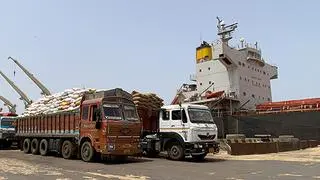Remunerative prices to farmers; balanced growth in the production of cereals, pulses, and oilseeds; facilitation of value chain in production and processing; and negating adverse impact of subsidies and price supports on deficit, environment, and farmers’ health are the four inter-related reform issues that need to be addressed in Indian agriculture.
The government began bold reforms in 2020 when it enacted two new farm laws and amended a third one. These laws were expected to provide remunerative prices to farmers by providing pan-India competition to the oligopsonist APMC markets, give opportunity for quality management through contract farming, and facilitate assured input supply and scale economies in the value chain. Eventually, these policies would have made minimum support prices (MSP) redundant.
The reforms had a false start though. The new Acts introduced in September 2020 faced protests. Petitions were filed against the laws and the Supreme Court issued a stay order. The Court also appointed a committee to gather stakeholders’ views and a report was submitted in March 2021.
However, even before the report could be made public, the government rescinded the Acts in December 2021. This quick succession of events leading to scrapping of the laws is a classic example of governments getting the science of reforms right but missing out on the art of implementation. So, what went wrong?
While one may realise the futility of MSP and APMCs, one must remember that this combination was offered to farmers for decades to address the issues of hunger and food security. The existing cropping pattern is the result of these past policies.
Mandi fees factor
The government must also recognise that mandi fees have been a big source of revenue to the APMCs. Studies show that revenue from APMC mandi fees was close to ₹10,000 crore in 2019-20 and States such as Punjab, Haryana, and UP had earned mandi fees in excess of ₹1,000 crore.
In Punjab, APMC market fees rate has been as high as 2.5 per cent and APMCs have also resorted to taking loans against potential APMC revenues. Therefore, instant implementation of the farm reforms was bound cause stiff resistance to it. Stakeholders accustomed to the existing incentives could not have changed their behaviour immediately. They need time and support to alter their worldview and behaviour. Traders and big farmers who lose out due to reforms are relatively few in numbers, their per household losses are high; and they can effectively lobby in organising protests.
On the other hand, while gains may be larger, the disparate small farmers are thinly spread across the country unable to organise an agitation to support their individual gains.
Another important facet the government missed was the overlapping jurisdiction between the Centre and the States on issues related to agriculture. The Schedule 7 (Article 246) of the Constitution makes agriculture a predominantly State subject.
Up until 2013, the Planning Commission was in existence and States could voice their opinions, respond to incentives, and get funds from the Commission. However, the Planning Commission was replaced by the NITI Aayog in 2014, which neither has funds to give to the States nor has a regular mechanism for interaction between Centre and the States on agricultural issues.
Moreover, the Centre-State relations in regard to agriculture are complex, for Concurrent List of Schedule 7 has provided powers to both to control production, trade, commerce, supply and distribution of goods of any industry, including agriculture.
Centre, States cooperation
In fact, responsibility of negotiations on agricultural trade at WTO and fixing of MSP are vested with the Centre. Therefore, both Centre and the States are equal stakeholders in development of the agricultural sector, and, only a spirit of cooperative federalism will ensure success of farm reforms.
Looking forward, the government may do well in establishing Agricultural and Food Marketing (AFM) Council on the lines of GST Council for furthering farm reforms. An AFM Council can be chaired by Union Minister of Agriculture, and Agriculture Ministers of all States and Union Territories can be its members.
Since negotiations on agricultural liberalisation at forums such as WTO are entrusted with the Ministry of Commerce, Union Minister of Commerce should also be part of the Council. In AFM Council, despite divergent public postures and grandstanding, law makers of different parties and ideologies can frankly discuss issues in a collegial atmosphere in close-door, off-camera meetings. They can consult experts and experienced civil servants without hesitation. Reform bills that get drafted in such manner turn out to be a non-zero sum game among the lawmakers with a high rate of success.
Under the aegis of AFM, a structural adjustment and direct benefit transfer (DBT) programme may be initiated. The farm reform Acts may be implemented in staggered manner. For example, changes introduced through reform Acts could first be introduced in the fruits, vegetables, and other horticultural crops where MSP was not prevalent and States had already initiated contract farming.
Thereafter, the reforms can be introduced in cash crops such as cotton and sugarcane, followed by oilseeds and pulses, and, finally in cereals. Concurrently, a plan for devolution of funds to APMCs for their lost revenues can be implemented as well. Such adjustment programme can be staggered over a period of five years so that there are no policy surprises.
Similarly, an integrated direct benefit transfer (DBT) to farmers and sharecroppers should be initiated in lieu of MSP and subsidies. This has multiple benefits. While the MSP reach is limited, DBT can reach all farmers and sharecroppers.
A fixed amount of DBT per household helps poor far more relatively. Once DBT is introduced and MSP and subsides are out, market prices will give signals to farmers for optimal selection of inputs and crops. This will prevent excessive use of inputs and lop-sided growth in production of cereals.
Finally, DBT transfers to Jan Dhan Accounts will also prevent leakage and delays in disbursement.
The writer is Professor, Economics Area, Indian Institute of Management Ahmedabad (IIMA)








Comments
Comments have to be in English, and in full sentences. They cannot be abusive or personal. Please abide by our community guidelines for posting your comments.
We have migrated to a new commenting platform. If you are already a registered user of TheHindu Businessline and logged in, you may continue to engage with our articles. If you do not have an account please register and login to post comments. Users can access their older comments by logging into their accounts on Vuukle.